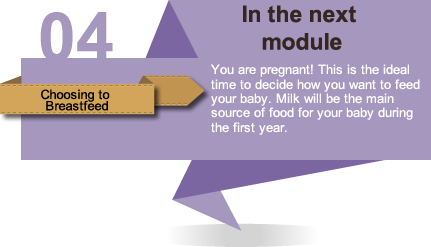Becoming a Dad
INTRODUCTION
The father's role during pregnancy is not limited to satisfying his partner's desires or rushing her to the hospital for the delivery. If your partner is expecting a child, so are you. Pregnancy is not only a woman's affair.

The future dad goes through a range of sometimes contradictory emotions. One day he is happy and proud, the next he is overwhelmed by the event and even sometimes feels powerless when facing all these changes. The father's feelings change as the baby's birth approaches.
All these emotions are normal. All dads experience their partner's pregnancy differently. It is important that you learn all you can about pregnancy in order to be better prepared for the great adventure of fatherhood.
A. THE FATHER AND PREGNANCY
You have found out that your partner is pregnant. For some, it is an expected event while for others it is a complete surprise. No matter what the situation is, the arrival of a new child in the family can provoke a variety of feelings for the father.
This section explores certain emotions you may feel. We offer you some advice that may help you cope with these new emotions.
a. Possible Emotions
Test Your Knowledge
|
|
This is an exercise that will help you find solutions to cope with the changing emotions caused by your partner's pregnancy.
Click on the button that corresponds to the correct answer and check your answer by clicking on the "Check" button.
|
1 |
The best person to discuss my emotions with is my partner. |
|
2 |
A future dad needs to inquire about pregnancy as much as a future mom. |
|
3 |
The father should attend the prenatal appointments. |
|
4 |
Delivery is a woman's affair. It is up to her exclusively to decide what kind of delivery she wants. |
|
5 |
The father has an input on the decision to breastfeed or not. |
|
6 |
It is good to discuss the future during pregnancy. |
b. Violence against Women during Pregnancy
Violence against women often begins during the first pregnancy. All forms of violence can be harmful and must be taken seriously.

There are different types of violence. The following table may help you to recognize the different types.
A female victim of violence may feel anxious and depressed, have no self-esteem, take drugs and alcohol, have difficulty sleeping, and may lose her appetite.
Physical aggression during pregnancy can cause serious injuries to the mother and may cause a premature birth or an insufficient birthweight. Aggression could also lead to broken bones or haemorrhage in the fetus. Some mothers have lost their babies following physical violence.
If you are violent with your partner during her pregnancy, you need help immediately.
Nobody deserves to be treated badly; certainly not your baby. Talk to someone about your feelings and concerns. Inquire about organizations which offer help to violent men. Persons with special training will help you find solutions to end this violence.
B. THE ROLE OF THE FATHER DURING LABOUR AND DELIVERY
In the past, few men were present during delivery. Today, things have changed for the better and your partner probably wishes that you will be with her during labour and delivery. You made your baby together, and it is together that you should welcome your baby into the world.

However, for various reasons, some men prefer not to be present for the delivery. It is a very personal decision. If this is your case, discuss it with your partner and make her understand why you do not want to attend. Help her find a partner you both trust to be with her during labour and delivery.
a. The Emotions of a Father Facing Delivery
This is what you may feel immediately before the delivery.
- You are excited about the baby finally arriving.
- You are worried about not arriving at the hospital on time. You worry that something will go wrong for your partner or your baby.
- You are overwhelmed by the course of events.
- You are not sure of what is happening or what you should do.
- You hope you will be able to alleviate your partner's pain.
- You feel ready for this experience.

b. Advice to Prepare Yourself for the Delivery
C. THE NEW DAD
Finally, the baby is here. The delivery is behind you and the baby is at home. You will, without a doubt, find it incredible how such a small being can so drastically change your life. Don't worry. As time goes on and you get acquainted with your baby, things will return to normal. It may take a few months. Enjoy these unique moments with your little family.

a. The Feelings of a New Dad
Nobody is indifferent to the birth of a baby. Each person reacts in their own way.
The father cannot overlook the emotions he feels at the birth of a baby.

This section contains advice to help you adjust to your new role as a father.
1. Feelings
As a father you will feel different emotions at the birth of your child. You may be surprised by the intense love you will feel for your baby as well as the tenderness the baby inspires.

Similarly to new mothers, certain fathers do not instantly feel love for their baby. Don't worry. Give yourself time.
Test Your Knowledge
|
|
This activity will help you to understand the feelings the birth of a baby may arouse in a new father.
Click on the button which corresponds to your selected answer and check your answer by clicking on the "Check" button
|
1 |
At the birth of the baby, the new dad |
|
2 |
During the first few days after the birth, the new dad |
|
3 |
During the first few days at home, the father may feel |
|
4 |
The newborn is |
|
5 |
Most of the new fathers are preoccupied by |
|
6 |
About sexuality, the new fathers |
b. A Guide for the New Father
c. The Father and Breastfeeding
As the father of a breastfed baby, you are essential to the success of this experience. During the pregnancy, inquire about the advantages of breastfeeding for the baby, for your partner, and for your family. Share your concerns with your partner or anybody else near you. It could be a nurse or doctor for example. Have this discussion before the birth of the baby.

Here is how the father can contribute to the success of breastfeeding.
d. Postpartum Depression
If you notice that your partner is depressed for long periods and that she has trouble managing her emotions, contact a health professional. Postpartum depression can occur in the first two to three weeks after delivery or many months if not years later. This can also happen to a woman who adopts a child. This type of depression seems to occur more frequently to women with a family history of depression, but it can occur without any apparent reason and without warning.

The woman suffering from postpartum depression feels sad, unhappy, and anxious. These feelings last longer than two weeks. The feelings and the symptoms are similar to the baby blues but are more intense and last longer. A health professional will work with your partner and find the best treatment for her. You will find more information on this topic in Module 8 entitled "Healthy Family".
e. The Baby's Cries
It is normal for a baby to cry. Crying is the only way a baby can let you know when something is wrong. Loneliness, the need for a diaper change, or to be cuddled can make a baby cry. A baby will cry if he or she is sick, uncomfortable, or if he or she feels alone. Babies may also cry because they are hungry, however, crying is a late sign of hunger. An infant crying from hunger may be too upset to settle down to feed. It is important you get to know your baby's early feeding cues. Please refer to module 4 for more information on infant feeding cues.

Most babies have a fussy period every day, and it is more difficult to comfort them during this time. A six-week old baby cries an average of two to three hours per day. Certain babies cry because they are colicky. They may cry day and night. The crying becomes unbearable, and the parents often become frustrated and angry. You may feel tired, alone, incompetent, disappointed, or desperate.
2. The Baby that Cries Continuously
Certain babies are inconsolable. To hear an infant crying continuously is difficult to handle. Don't hesitate to take a break. If you have the impression that you are going to lose patience, here is what you can do.
If you have the impression that your baby has been crying for hours and that nothing seems to help, you are probably exhausted and angry. No matter how you feel, never shake your baby.
3. Shaken Baby Syndrome
This is what happens when a baby is shaken.
- Your infant will feel pain and will be afraid, which will make it cry even more.
- When you shake your baby, its head will be tossed frontward and backward. The baby is not strong enough to stop the movement.
- Because the baby's head is large compared to the rest if its body, you must support its head when lifting or laying the baby down.
- Your baby's brain is delicate. When a baby is shaken, its brain strikes against the interior of its head which can result in bleeding. Shaking can cause brain damage leading to convulsions, learning disabilities, behavior problems, or even death.
- Babies of less than eleven months are easily injured if shaken. Even older children may be injured. Throwing a baby up in the air or swinging them without supporting the head can also injure the baby.
Talk with everyone involved in the care of your baby such as older children, babysitters, friends, family, or any intervener responsible for taking care of the baby. Tell them to be careful and never to shake your baby. Never leave your baby with someone that has a violent temper or someone you don't know.
If a baby seems to have stopped breathing, call 911. Shaking a baby will not cause it to start breathing but could injure him or her.
 |
ATTENTION ! Never shake your baby. It only takes a few seconds to cause permanent injury. |
CONCLUSION
Similarly to the mother, becoming a father also implies being comfortable caring for the baby. As your relationship with your child develops, you will have more confidence and satisfaction assuming your role in the family.
Offer your child love and affection which are more important than material gifts. You will both profit from the bond between you and your child. An attentive and committed father plays an important role in the emotional, social, and mental well-being of his child not only when he or she is small but for the rest of his or her life.









